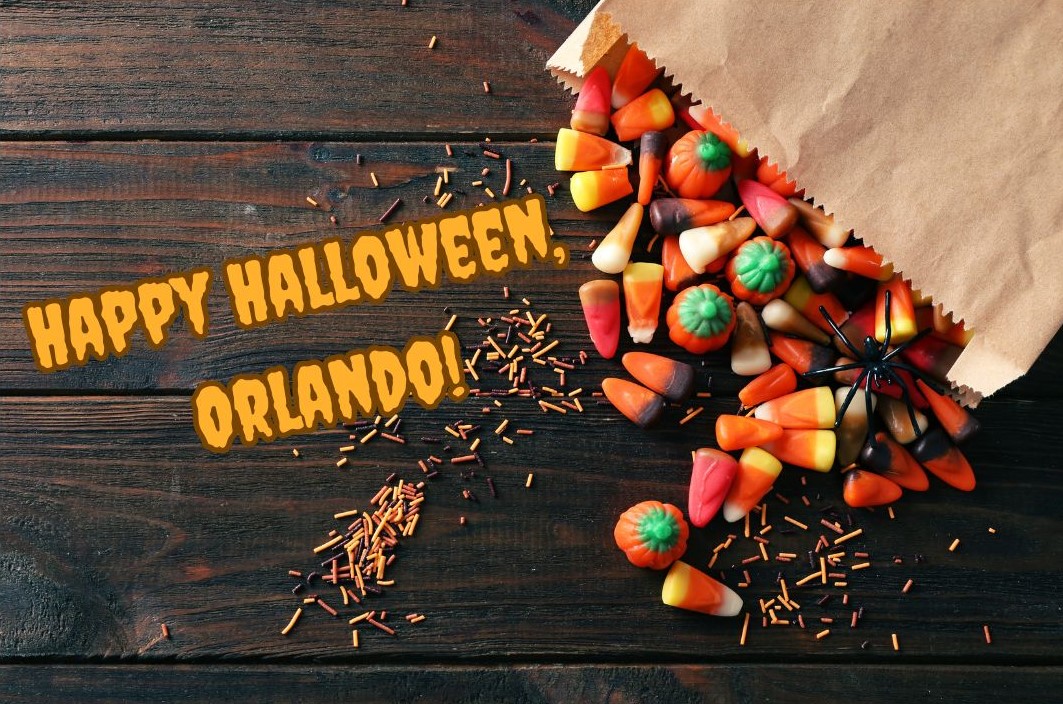The cinnamon brooms are out at Publix, and that can only mean one thing: it’s Spooky Season in Florida! Especially in Baldwin Park, we love our trick-or-treat traditions.
Whether you went this weekend or you’re planning to set your ghouls loose on the 31st, you may be wondering what your dentist has to say about giving your kids candy.
Can your kids eat Halloween candy without getting cavities? Let’s talk about it!
Just Say No to Candy?
You may assume your friendly neighborhood dental team here at Lake Baldwin Dental would be Team No Candy. But we love Halloween treats just as much as the next family!
So no, you don’t have to forbid your kids from eating candy to protect their teeth. There are three main things to consider when talking about candy and cavities.
- What type of candy is it?
- When are you eating it?
- How are you cleaning plaque and sugar off your teeth?
1. What Types of Candy Are Better for Teeth
Not all candy is created equal. Some types of candy have the potential to do more damage than others.
How sugar damages your teeth is all about exposure time. Each sugar exposure makes your mouth more acidic for about 20 minutes before your saliva can buffer that acid and bring it closer to its baseline neutral(ish) pH.
So sucking candies like lollipops that sit in your mouth for a long time will expose your teeth to sugar and acid for a long time.
Chocolate, on the other hand, goes away pretty fast after you eat it, especially if you rinse with water afterward.
2. When to Eat Candy
Even though chocolate has a relatively shorter exposure time than hard or sticky candies, snacking on it throughout the day means multiple 20-minute exposures. And that adds up!
If you’re going to eat candy, eat it, rinse, and move on with your day. Try not to take little sneaky bites all day.
Likewise, make sure your kids aren’t eating candy right before bed. It may seem like saving candy for dessert after dinner is the way to go, but any residue that gets packed down into the grooves of those molars will sit there overnight while there’s less saliva to wash it away, making its potential for damage much greater.
3. How Are You Cleaning Up?
Yes, your kids can eat candy and not get cavities! Tooth decay is a more complicated process than many people think.
Sugar doesn’t give you cavities on its own. Crazy, I know. What actually happens is that the bacteria that cause cavities digest sugar and pump out acid as a waste product. And the cavity-causing bacteria are the ones that love sugar the most.
So, when you eat sugary foods, those cavity-causing bacteria get really happy. The longer that sugar sits on your teeth, the more those bacteria can eat, and the more waste (acid) they can produce.
Acid then breaks the molecular bonds in the crystal matrix of your enamel. We call this decalcification. Basically, the enamel becomes less dense, less durable, and softer. Over a long enough timeline, those broken molecules in one area can’t maintain their normal structure and cave in. Voila, cavity.
So What Does That Mean?
Decay takes bacteria plus bacteria food. Take away either, and you’re less likely to get a cavity. So if you’re going to eat candy, make sure your teeth are free of plaque. Make sure that sugar doesn’t stick around long enough to feed whatever bacteria are left over. Then, feed your teeth fresh minerals to rebuild whatever damage the acid has done.
- Brush twice daily with good technique. Hit the gum line and grooves of those molars. Good brushing should take at least 2 full minutes. An electric toothbrush can help ensure good technique.
- Floss or clean between the teeth with a water flosser at least once per day. Those areas between the teeth build up the most plaque and get the most cavities, so be sure to clean them every day!
- Use fluoride toothpaste and/or mouthwash. Fluoride is a naturally occurring mineral that plugs in the holes in the crystal structure of your enamel. So as acid breaks down the enamel, fluoride builds it back up, preventing cavities.
What If Halloween Candy Makes Your Teeth Hurt?
If sugary foods make your teeth hurt, it’s worth mentioning to your dental team.
Sugar can trigger tooth sensitivity because that shift in pH irritates sensitive nerve endings in the tooth. This can happen if you have gum recession, or your teeth are generally just sensitive.
However, it can also mean trouble. Decay and other dental health issues can make your teeth more sensitive to that pH shift when you eat sweets because the nerve endings are more exposed to the oral environment and the bacteria have irritated the nerves, so they’re already on edge.
If your teeth hurt when you bite on a hard candy, that can also indicate a problem like a crack developing.
When should you talk to your dentist about teeth hurting when you eat sugar? It depends! If the discomfort is mild and goes away fairly quickly on its own, and if you already have sensitive teeth, you can probably wait until your next cleaning and check-up to mention it.
But. You should call your dentist about sore teeth if:
- The pain lingers.
- The pain is very intense.
- Your teeth become sensitive to hot foods or beverages.
- Your teeth feel sensitive for no reason at all.
- Tooth pain wakes you up at night.
- Your tooth sensitivity becomes a throbbing or shooting pain.
- You’ve never had sensitive teeth and suddenly feel sensitivity in one specific tooth but not its neighbors.
We’re always happy to help you troubleshoot your tooth pain. We want you to enjoy your favorite foods (candy included) in comfort! Keep smiling and Happy Halloween, Orlando!


